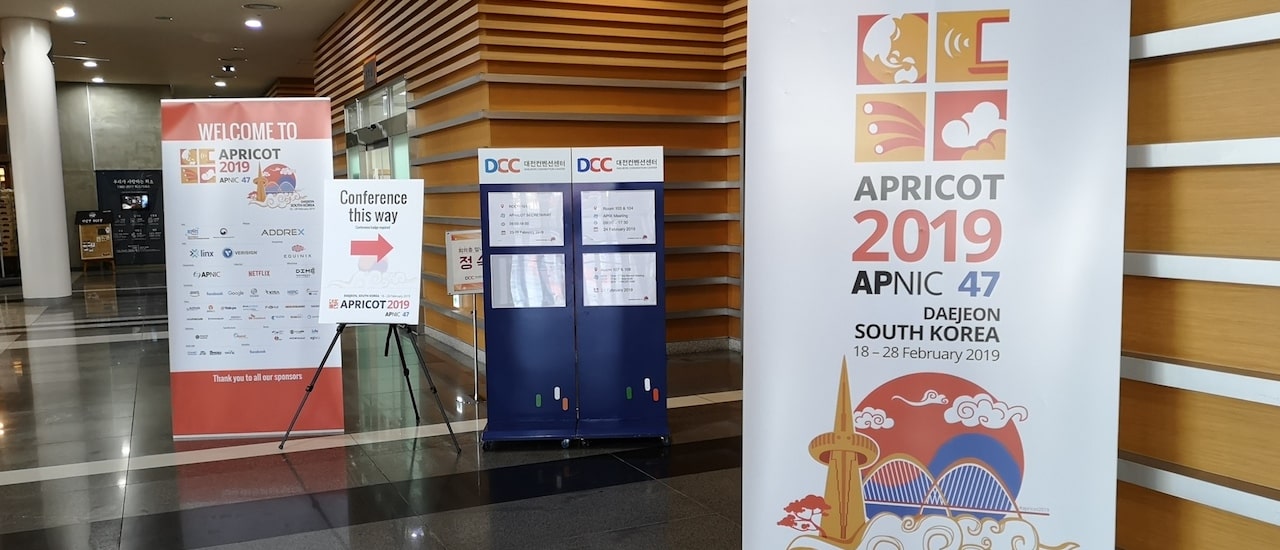Asia Pacific Regional Internet Conference on Operational Technologies (APRICOT) 2019, said to be the largest technical conference in the region, drew hundreds of the world’s leading Internet engineers from over 50 countries to Daejeon, South Korea last week.
The Internet Society, a long-time partner of the event, contributed to the event by not only sponsoring over a dozen of fellows to travel there, but also made multiple high-profile appearances in various sessions, including the opening keynote speech.
The Internet Society’s President and CEO Andrew Sullivan delivered the keynote Up and Down the Stack Through a Nerd’s Eyes: Making the Internet Better the Internet Way with hundreds of people present, including Tae-Jeong Her, Mayor of Daejeon, and Dr Hee-yoon Choi, President of organiser the Korea Institute of Science and Technology Information (KISTI), a government research institute.
Now that so many people depend on the Internet, it is no surprise that businesspeople, policymakers, regulators, and politicians all want a say in the way the Internet evolves. But some of the proposals for the future of the Internet, Sullivan said, betray fundamental misunderstandings of the way the Internet works. The talk urged us all to continue to engage with the big questions that affect the future of the Internet, and to bring to that engagement the technical understanding of how the Internet depends on the community of independent network operators in order to remain healthy and strong.
The Internet Society delegation this year also included Rajnesh Singh, Regional Director of the APAC Bureau; Aftab Siddiqui, Technical Engagement Manager, APAC; Salam Yamout, Regional Director, Middle East; Andrei Robachevsky, Senior Technology Programme Manager; Sally Harvey, Director, Membership and Partnership Development; and me, Outreach Manager, APAC.
In line with the Internet Society’s 2019 Action Plan, our message at APRICOT 2019 was to give voice to the need to improve the Internet’s technical security, specifically routing security. That was why in different sessions we promoted the Mutually Agreed Norms for Routing Security (MANRS), a global initiative of the Internet Society that provides operators with steps to mitigate the most common routing threats.
We undertook a variety of roles at the conference and side events, including chairing and speaking at the AP* Meeting, speaking at the APNIC Global Reports, speaking at the APNIC Cooperation SIG, as well as several other speaking and moderation roles. We also had a number of bilateral meetings with other Internet organisations throughout the week.
I had the pleasure to moderate the ISOC@APRICOT session, in which we introduced the community to our work plans and invited them to exchange views on broad Internet issues in the region with us. We were much encouraged by the support of some Internet Society Chapter leaders and members who told us more about their local communities.
In the session, Sullivan introduced the 2019 Global Internet Report: Consolidation in the Internet Economy, which explores the growing influence of a few powerful players in the Internet economy.
The study is the beginning of a conversation about the implications of concentration in the Internet economy. Our analysis shows the questions surrounding these trends are very complex, and hasty interventions could lead to unintended consequences and harm for the Internet and its users. More work must be done to understand this important issue.
“I hope you’ll join us and help identify gaps that we haven’t done or suggest ways to improve the study,” Sullivan concluded the session by introducing our research funding opportunities.
Read the 2019 Global Internet Report: Consolidation in the Internet Economy to understand key features of consolidation, the impact of emerging trends on the Internet, and explore the questions it raises.

